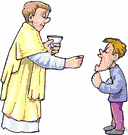Many Christians also believe the Last Supper marked the institution of what is now the
sacrament of the Eucharist. The Gospels of Mark, Matthew and Luke include accounts of the sharing of the bread and wine, though each account differs slightly.
Santos gave a talk on Mercy and the
Sacrament of the Eucharist.
The poem creates a question from the challenge St Augustine gave his people when he preached on the
sacrament of the Eucharist in the fourth century When Augustine spoke of the body and blood of Christ in the Eucharist, he said they "are called sacraments because in them one thing is seen, while another is grasped....
Much as the
sacrament of the Eucharist physically incarnates the reality of the divine, here the texts associated with characters concretely manifest the truth of their lived realities.
The IEC's history can be traced back to 1881 to promote awareness on the
Sacrament of the Eucharist of the Catholic Church.
The motivation for this practice is two-fold: a) first, to avoid, as much as possible, the dropping of Eucharistic particles; b) second, to increase among the faithful devotion to the Real Presence of Christ in the
Sacrament of the Eucharist.
The center of this union lies in the reception of the
sacrament of the Eucharist during Mass, which is both a confession and embodiment of unity with the Roman Catholic Church.
Bales's study follows two classes of first communicants in different parishes through the yearlong process of preparing for and receiving the
sacrament of the Eucharist for the first time.
Stanza four deals with the
sacrament of the Eucharist, the gift of bread and wine through which we are renewed, forgiven, and absolved.
Eucharistic Doctors is a very highly recommended read for all students of the Christian faith in general, and the Christian
sacrament of the eucharist in particular.
'The
Sacrament of the Eucharist is, among other things, about unity, bringing the congregation together in love through participation in the body and blood of Christ.
Renaissance theologians, on the other hand, especially those at Trent, distinguished between decrees on the Most Holy Sacrifice of the Mass and on the Most Holy
Sacrament of the Eucharist. In this way of thinking and talking the unity of the ancient rite was fragmented and the eucharistic sacrifice became, as a result, either a "Protestant" commemoration of a past act, or "Catholic" repetition and reenactment of a redemption that was likewise wholly in the past.
 sacrament of the Eucharist - a Christian sacrament commemorating the Last Supper by consecrating bread and wine
sacrament of the Eucharist - a Christian sacrament commemorating the Last Supper by consecrating bread and wine